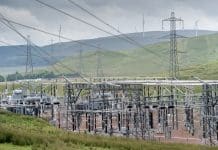Network Rail’s new modular bridge design that could transform rail crossings across Britain has been unveiled at Rail Live
Network Rail currently has just one option when considering building a new footbridge or replacing an old one, the standard non-station footbridge design that is heavy, unattractive and expensive to deliver.
Made from a lightweight material, the new environmentally friendly bridge design can be installed in a matter of days, and its modern, modular design means it can be adapted to different locations.
It also features built-in monitoring to assess usage and maintenance needs.
This new design is made from Fibre-Reinforced Polymer (FRP) – a lightweight material that is widely used in other industries, including the manufacture of aircraft and cars. The material is very strong but lightweight, leading to lower transport and installation costs.
It is hoped the ground-breaking design will be adopted across the country as part of a wider programmer of work to transform how footbridges are built on the rail network in future, as well as providing an attractive alternative to repairing existing crossings.
The next phase of the project involves developing sustainable procurement and construction options as well as a ramped version of the bridge.
The prototype has been trial built at a test centre in Long Marston, Warwickshire, and will go on show there at the 2021 RAIL Live event on June 16-17.
Bringing a lightweight, low-cost footbridge to life
Andy Cross, Network Rail programme manager, said: “We were able to take a different approach.
“This has allowed us to work with several small and medium-sized businesses, many of whom haven’t worked on railway projects before but have the skills and expertise to bring the concept of a lightweight, low-cost footbridge to life.
“In just 11 months we have developed a prototype bridge that is stunning in design, environmentally friendly and will take days and not weeks to install and thereby causing less disruption for the surrounding community.”







![[VIDEO] Cambridge waste water plant granted permission to relocate Artist impression of the new Cambridge waste water plant and surrounding land](https://www.pbctoday.co.uk/news/wp-content/uploads/2025/04/p.151-768x364-1-218x150.jpg)







Have you performed an EqIA? It certainly looks totally non-inclusive